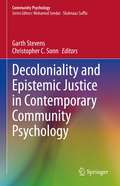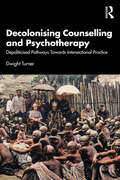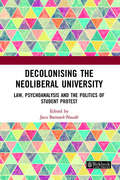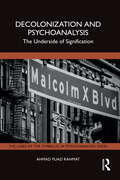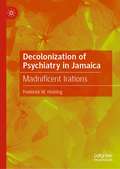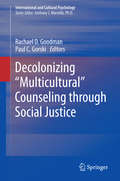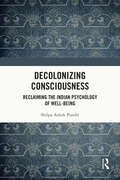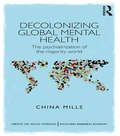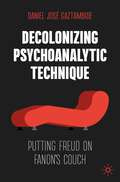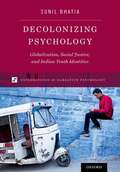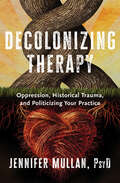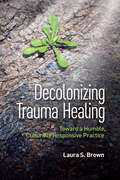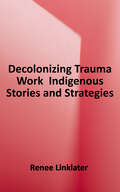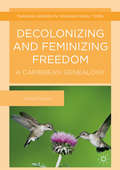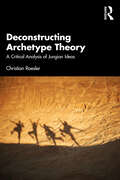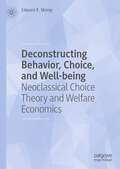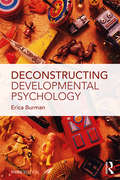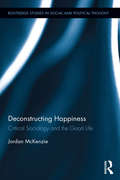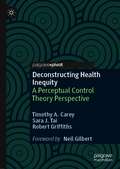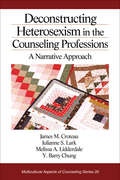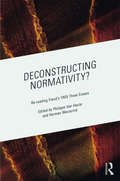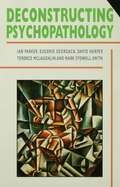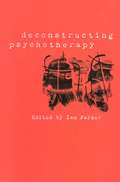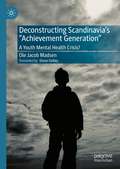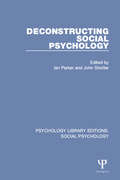- Table View
- List View
Decoloniality and Epistemic Justice in Contemporary Community Psychology (Community Psychology)
by Christopher C. Sonn Garth StevensThis book examines the ways in which decolonial theory has gained traction and influenced knowledge production, praxis and epistemic justice in various contemporary iterations of community psychology across the globe. With a notable Southern focus (although not exclusively so), the volume critically interrogates the biases in Western modernist thought in relation to community psychology, and to illuminate and consolidate current epistemic alternatives that contribute to the possibilities of emancipatory futures within community psychology. To this end, the volume includes contributions from community psychology theory and praxis across the globe that speak to standpoint approaches (e.g. critical race studies, queer theory, indigenous epistemologies) in which the experiences of the majority of the global population are more accurately reflected, address key social issues such as the on-going racialization of the globe, gender, class, poverty, xenophobia, sexuality, violence, diasporas, migrancy, environmental degradation, and transnationalism/globalisation, and embrace forms of knowledge production that involve the co-construction of new knowledges across the traditional binary of knowledge producers and consumers. This book is an engaging resource for scholars, researchers, practitioners, activists and advanced postgraduate students who are currently working within community psychology and cognate sub-disciplines within psychology more broadly. A secondary readership is those working in development studies, political science, community development and broader cognate disciplines within the social sciences, arts, and humanities.
Decolonising Counselling and Psychotherapy: Depoliticised Pathways Towards Intersectional Practice
by Dwight TurnerDecolonisation is a term which has become a modern day buzzword as we look to understand the influences of the systemic structures of oppression which have molded all of our identities, yet, in the worlds of counselling and psychotherapy there has been a struggle to understand what this term means in regard to our profession. Decolonising Counselling and Psychotherapy considers the ways in which the systems of colonization have taken over and are continually reconstituted within our profession. This book challenges our profession, by offering practical ways in which we might diversify our practices, proffering varying perspectives about how to create pathways for greater inclusion in training courses, and examines the many opportunities to explore and expand the ways in which we undertake research. Most importantly, it will encourage the therapist to look at the internalised experiences of colonisation on themselves. The book shows that working creatively with techniques common to counselling and psychotherapy could lead the profession to not only broaden out what it knows and understands of human nature, but through a process of decolonisation, assist in meeting the needs of a wider range of clients.This book will be invaluable to counsellors, psychotherapists and psychologists working in the helping professions, and to those whose activism drives them to want to make our helping professions more inclusive and equitable.
Decolonising the Neoliberal University: Law, Psychoanalysis and the Politics of Student Protest
by Jaco Barnard-NaudéTaking the postcolonial – or, more specifically, the post-apartheid – university as its focus, the book takes the violence and the trauma of the global neoliberal hegemony as its central point of reference. Following a primarily psychoanalytic line of enquiry, it engages a range of disciplines – law, philosophy, literature, gender studies, cultural studies and political economy – in order better to understand the conditions of possibility of an emancipatory, or decolonised, higher education. And this in the context of both the inter-generational transmission of the trauma of colonialism, on the one hand, and, on the other, the trauma of neoliberal subjectivity in the postcolonial university. Oriented around an important lecture by Jacqueline Rose, the volume contains contributions from world-renowned authors, such as Judith Butler and Achille Mbembe, as well as numerous legal and other theorists who share their concern with interrogating the contemporary crisis in higher education. This truly interdisciplinary collection will appeal to a wide range of readers right across the humanities, but especially those with substantial interests in the contemporary state of the university, as well as those with theoretical interests in postcolonialism, psychoanalysis, gender studies, cultural studies, jurisprudence and law.
Decolonization and Psychoanalysis: The Underside of Signification (The Lines of the Symbolic in Psychoanalysis Series)
by Ahmad Fuad RahmatDecolonization and Psychoanalysis challenges conventional psychoanalytic assumptions by revisiting Lacan’s conceptualization of the materiality of speech through a decolonial lens.Ahmad Fuad Rahmat explores how Lacan’s ideas about the symbolic order and its historical development are intertwined with decolonial assumptions, and proposes that critically considering these assumptions can pave the way for a decolonial psychoanalysis. The book begins with how Lacan uses Freud’s Jewishness as a marginalized perspective that reveals the excluded dimensions of signification within the symbolic order, and examines James Joyce’s anti-colonial politics and its significance for Lacan’s conception of the sinthome. The book includes a critique of Slavoj Žižek’s Eurocentric reading of Malcolm X as a foil with which colonized speech could be conceived as “symbolic dispossession”. Finally, it reframes the notion of “the gap” by understanding global capitalism as a mode of exchange to advocate for a decolonial psychoanalysis that focuses on the non-spaces of transmission as opposed to a like-for-like export of the clinic from the center to the periphery.Decolonization and Psychoanalysis will be of great interest to psychoanalysts and to scholars of psychoanalytic studies, critical theory, and cultural studies.
Decolonization of Psychiatry in Jamaica: Madnificent Irations
by Frederick W. HicklingThis book traces the historical postcolonial journey of four generations of Jamaican psychiatrists challenging the European colonial ‘civilizing mission’ of psychiatric care. It details the process of deinstitutionizing patients with chronic mental illness using psychohistoriographic cultural therapy, by engaging them in creating sociodrama and poetry writing, not only to express and reverse the stigma contributing to their marginalized status, but also to reconnect them to a centuries-long history of oppression. The author thereby demonstrates that psychological decolonization requires a seminal understanding of the complex mental inter-relationship between slaves and slaveowners. Further, it is shown how the model analyzes the antipodal dialectic history of descendants of Africans enslaved in the New World by brutish British Imperialists suffering from the European psychosis of white supremacy. Drawing together a detailed description of the sociopoem Madnificent Irations, with an examination of Jamaica’s political and social history, and the author’s personal experience, this compelling work marks an important contribution to decolonial literature. It will be of particular interest to students and scholars of postcolonial studies, critical race theory, the history of psychology and community psychology.
Decolonizing "Multicultural" Counseling through Social Justice
by Paul C. Gorski Rachael D. GoodmanMulticultural counseling and psychology evolved as a response to the Eurocentrism prevalent in the Western healing professions and has been used to challenge the Eurocentric, patriarchal, and heteronormative constructs commonly embedded in counseling and psychology. Ironically, some of the practices and paradigms commonly associated with "multiculturalism" reinforce the very hegemonic practices and paradigms that multicultural counseling and psychology approaches were created to correct. In Decolonizing "Multicultural" Counseling through Social Justice, counseling and psychology scholars and practitioners examine this paradox through a social justice lens by questioning and challenging the infrastructure of dominance in society, as well as by challenging ourselves as practitioners, scholars, and activists to rethink our commitments. The authors analyze the ways well-meaning clinicians might marginalize clients and contribute to structural inequities despite multicultural or cross-cultural training, and offer new frameworks and skills to replace the essentializing and stereotyping practices that are widespread in the field. By addressing the power imbalances embedded in key areas of multicultural theory and practice, contributors present innovative methods for revising research paradigms, professional education, and hands-on practice to reflect a commitment to equity and social justice. Together, the chapters in this book model transformative practice in the clinic, the schools, the community, and the discipline. Among the topics covered: Rethinking racial identity development models. Queering multicultural competence in counseling. Developing a liberatory approach to trauma counseling. Decolonizing psychological practice in the context of poverty. Utilizing indigenous paradigms in counseling research. Addressing racism through intersectionality. A mind-opening text for multicultural counseling and psychology courses as well as other foundational courses in counseling and psychology education, Decolonizing "Multicultural" Counseling through Social Justice challenges us to let go of simplistic approaches, however well-intended, and to embrace a more transformative approach to counseling and psychology practice and scholarship.
Decolonizing Consciousness: Reclaiming the Indian Psychology of Well-being
by Shilpa Ashok PanditThe book intertwines several strands of scholarship in Indian Philosophy, contemporary psychology and the lived Indian psychological practice inclusive of Yoga, advaita, tantra and bhakti to engage in an exploration of consciousness, cognitive science and philosophy. The book examines the characteristics of consciousness by situating it in the historical and cultural contexts of Euro-American as well as Asian, particularly Indian philosophical tradition specifically, the Bhakti tradition and creative living. The volume decolonizes the understanding of the ecology of consciousness while accounting for the diverse strands, which have given us a unique understanding of the mind, psychology, cognition and philosophy of the mind. This book will be of interest to students, teachers, and scholars of psychology, consciousness studies, cognitive science, philosophy, social psychology, Yoga studies, and Yoga psychology. It will also be useful for Yoga professionals, social workers, therapists, and anyone who is interested to learn about consciousness.
Decolonizing Global Mental Health: The psychiatrization of the majority world (Concepts for Critical Psychology)
by China MillsDecolonizing Global Mental Health is a book that maps a strange irony. The World Health Organization (WHO) and the Movement for Global Mental Health are calling to ‘scale up’ access to psychological and psychiatric treatments globally, particularly within the global South. Simultaneously, in the global North, psychiatry and its often chemical treatments are coming under increased criticism (from both those who take the medication and those in the position to prescribe it). The book argues that it is imperative to explore what counts as evidence within Global Mental Health, and seeks to de-familiarize current ‘Western’ conceptions of psychology and psychiatry using postcolonial theory. It leads us to wonder whether we should call for equality in global access to psychiatry, whether everyone should have the right to a psychotropic citizenship and whether mental health can, or should, be global. As such, it is ideal reading for undergraduate and postgraduate students, as well as researchers in the fields of critical psychology and psychiatry, social and health psychology, cultural studies, public health and social work.
Decolonizing Psychoanalytic Technique: Putting Freud on Fanon's Couch
by Daniel José GaztambideBoth new and seasoned psychotherapists wrestle with the relationship between psychological distress and inequality across race, class, gender, and sexuality. How does one address this organically in psychotherapy? What role does it play in therapeutic action? Who brings it up, the therapist or the patient? Daniel José Gaztambide addresses these questions by offering a rigorous decolonial approach that rethinks theory and technique from the ground up, providing an accessible, evidence-informed reintroduction to psychoanalytic practice. He re-examines foundational thinkers from three traditions—Freudian, relational-interpersonal, and Lacanian—through the lens of revolutionary psychiatrist Frantz Fanon, and offers a detailed analysis of Fanon’s psychoanalytic practice. Drawing on rich yet grounded discussions of theory and research, Gaztambide presents a clinical model that facilitates exploration of the social in the clinical space in a manner intimately related to the patient’s presenting problem. In doing so, this book demonstrates that clinicians no longer have to choose between attending to the personal, interpersonal, or sociopolitical. It is a guide to therapeutic action “on the couch,” which envisions political action “off the couch” and in the streets. Decolonizing Psychoanalytic Technique provides a comprehensive, practice-oriented and compelling guide for students, practitioners, and scholars of critical, multicultural and decolonial approaches to psychotherapy.
Decolonizing Psychology: Globalization, Social Justice, And Indian Youth Identities
by Sunil BhatiaIn recent years, the news media has directed a significant amount of attention to the effect of globalization on the second most populous nation in the world: India. With the emergence of new economic opportunities and the influx of foreign popular culture and commodities, India has experienced an enormous sea of change in the last few decades. In Decolonizing Psychology: Globalization, Social Justice, and Indian Youth Identities, author Sunil Bhatia focuses on the psychological tensions that these changes have brought upon Indian youth today.
Decolonizing Therapy: Oppression, Historical Trauma, and Politicizing Your Practice
by Jennifer MullanA call to action for therapists to politicize their practice through an emotional decolonial lens. An essential work that centers colonial and historical trauma in a framework for healing, Decolonizing Therapy illuminates that all therapy is—and always has been— inherently political. To better understand the mental health oppression and institutional violence that exists today, we must become familiar with the root of disembodiment from our histories, homelands, and healing practices. Only then will readers see how colonial, historical, and intergenerational legacies have always played a role in the treatment of mental health. This book is the emotional companion and guide to decolonization. It is an invitation for Eurocentrically trained clinicians to acknowledge privileged and oppressed parts while relearning what we thought we knew. Ignoring collective global trauma makes delivering effective therapy impossible; not knowing how to interrogate privilege (as a therapist, client, or both) makes healing elusive; and shying away from understanding how we as professionals may be participating in oppression is irresponsible.
Decolonizing Trauma Healing: Toward a Humble, Culturally Responsive Practice
by Dr. Laura S. Brown PhDThis book offers a critical examination of the field of trauma work using a decolonial lens, recentering narratives and approaches to healing in a more inclusive, culturally responsive way than that offered by dominant Eurocentric approaches. As trauma is a universal experience, a colonized paradigm for responding to trauma re-introduces problematic dynamics of domination and subjugation that are inimical to healing. Decolonizing Trauma Healing offers a new paradigm for how psychologists and other mental health providers can learn to properly understand and work with people whose lives, psyches, and souls have been damaged by exposure to trauma. Dr. Laura S. Brown introduces her decolonial, humble, culturally responsive (DHCR) model of trauma healing practice. It urges readers to abandon the concept of cultural competence and other approaches that maintain a Eurocentric perspective, in favor of a decolonial method that re-centers the sufferer's lived experience, with an understanding of the subtle ways in which the colonial mindset underlies the causes of trauma as well as our traditional conception of trauma healing. As a member of a colonized and marginalized culture, as well as in her work as a trauma healer, Dr. Brown serves as an inspiration for readers who want to understand why the traditional approach to trauma care has been insufficient, and all those who are ready to do the work needed to bring the field to a new level of clarity and rigor.
Decolonizing Trauma Work: Indigenous Stories and Strategies
by Renee LinklaterIn this book, the author explores healing and wellness in Indigenous communities on Turtle Island. Drawing on a decolonizing approach, which puts the "soul wound" of colonialism at the centre, the author engages ten Indigenous health care practitioners in a dialogue regarding Indigenous notions of wellness and holistic health, critiques of psychiatry and psychiatric diagnoses, and Indigenous approaches to helping people through trauma, depression and experiences of parallel and multiple realities. Through stories and strategies that are grounded in Indigenous worldviews and embedded with cultural knowledge, the author offers purposeful and practical methods to help individuals and communities that have experienced trauma. This is, one of the first books of its kind, is a resource for education and training programs, health care practitioners, healing centres, clinical services and policy initiatives.
Decolonizing and Feminizing Freedom: A Caribbean Genealogy (Thinking Gender in Transnational Times)
by Denise NobleThis book traces the powerful discourses and embodied practices through which Black Caribbean women have been imagined and produced as subjects of British liberal rule and modern freedom. It argues that in seeking to escape liberalism’s gendered and racialised governmentalities, Black women’s everyday self-making practices construct decolonising and feminising epistemologies of freedom. These, in turn, repeatedly interrogate the colonial logics of liberalism and Britishness. Genealogically structured, the book begins with the narratives of freedom and identity presented by Black British Caribbean women. It then analyses critical moments of crisis in British racial rule at home and abroad in which gender and Caribbean women figure as points of concern. Post-war Caribbean immigration to the UK, decolonisation of the British Caribbean and the post-emancipation reconstruction of the British Caribbean loom large in these considerations. In doing all of this, the author unravels the colonial legacies that continue to underwrite contemporary British multicultural anxieties. This thought-provoking work will appeal to students and scholars of social and cultural history, politics, feminism, race and postcoloniality.
Deconstructing Archetype Theory: A Critical Analysis of Jungian Ideas
by Christian RoeslerThis important book offers a critical and timely reassessment of one of the cornerstones of analytical psychology, Jung’s concept of archetypes. Exploring not only Jung’s original writings but also the range of interpretations used by Jungian scholars today, the book argues that Jung’s conceptualization of archetype theory is not a single coherent theory; rather, it is four different theories which must be understood separately. Roesler goes onto deconstruct these four ideas: the biological, the anthropological, the transcendental and the psychological in context with contemporary insights from each of these disciplines. A thorough analysis of the state of knowledge in the respective disciplines (i.e. biology, anthropology, religious and mythological studies) makes clear that the claims archetype theory makes in these fields have no support and should be given up. Deconstructing Archetype Theory concludes by arguing that a universal process of psychological transformation is the only part of archetype theory which should be maintained, as it provides a map for psychotherapy.Rigorous and insightful, this is a book that will fascinate scholars and practitioners of analytical psychology, as well as anyone with an interest in Jung’s original work.
Deconstructing Behavior, Choice, and Well-being: Neoclassical Choice Theory and Welfare Economics
by Edward R. MoreyNeoclassical economists assume that people act to maximize their well-being: they choose based on their desires and only desire what they will like. Neuroscientists and psychologists disagree. Their research demonstrates that cues and evolutionary quirks cause people to act against their best interests, even choosing alternatives they will not like. In this book, Edward R. Morey contrasts neoclassical choice theory with behavioral models and findings in psychology, neuroscience, evolutionary biology, and animal behavior. The book addresses the fundamental idea within economics that behaviors are chosen, and it explains why other disciplines disagree. The chapters touch on modeling behavior, judging behavior, and policies. Morey breaks down judgment using the ethics of welfare economics, and it compares and contrasts this recognized approach with others, including Mill’s liberalism, virtue ethics, duty-based ethics, Buddhist ethics, and utilitarianism.
Deconstructing Developmental Psychology
by Erica BurmanIn this completely revised and updated edition, Deconstructing Developmental Psychology interrogates the assumptions and practices surrounding the psychology of child development, providing a critical evaluation of the role and contribution of developmental psychology within social practice. Since the second edition was published, there have been many major changes. This book addresses how shifts in advanced capitalism have produced new understandings of children, and a new (and more punitive) range of institutional responses to children. It engages with the paradoxes of childhood in an era when young adults are increasingly economically dependent on their families, and in a political context of heightened insecurity. The new edition includes an updated review of developments in psychological theory (in attachment, evolutionary psychology, theory of mind, cultural-historical approaches), as well as updating and reflecting upon the changed focus on fathers and fathering. It offers new perspectives on the connections between Piaget and Vygotsky and now connects much more closely with discussions from the sociology of childhood and critical educational research. Coverage has been expanded to include more material on child rights debates, and a new chapter addresses practice dilemmas around child protection, which engages even more with the "raced" and gendered effects of current policies involving children. This engaging and accessible text provides key resources to inform better professional practice in social work, education and health contexts. It offers critical insights into the politics and procedures that have shaped developmental psychological knowledge. It will be essential reading for anyone working with children, or concerned with policies around children and families. It was also be of interest to students at undergraduate and postgraduate levels across a range of professional and practitioner groups, as well as parents and policy makers.
Deconstructing Happiness: Critical Sociology and the Good Life (Routledge Studies in Social and Political Thought #109)
by Jordan McKenzieThis book offers an original account of the good life in late modernity through a uniquely sociological lens. It considers the various ways that social and cultural factors can encourage or impede genuine efforts to live a good life by deconstructing the concepts of happiness and contentment within cultural narratives of the good life. While empirical studies have dominated the discourse on happiness in recent decades, the emphasis on finding causal and correlational relationships has led to a field of research that arguably lacks a reliable theoretical foundation. Deconstructing Happiness offers a step toward developing that foundation by offering characteristically sociological perspectives on the contemporary fascination with happiness and well-being. In doing so, it seeks to understand the good life as a socially mediated experience rather than a purely personal or individually defined way of living. The outcome is a book on happiness, contentment and the good life that considers the influence of democracy, capitalism and progress, while also focusing on the more theoretical challenges of self-knowledge, reason and interaction.
Deconstructing Health Inequity: A Perceptual Control Theory Perspective
by Timothy A. Carey Sara J. Tai Robert GriffithsThis book offers a radically different perspective on the topic of health inequity. Carey, Tai, and Griffiths use Perceptual Control Theory (PCT) to deconstruct current approaches to understanding, investigating, and addressing problems of health inequity. In the book, the authors propose that health inequity is not a problem per se. Disrupted control, they argue, is the problem that needs to be addressed. From this perspective, research, policy, and health practices directed at addressing health inequity in isolation will offer only partial solutions to the problems created by disrupted control. Addressing problems of disrupted control directly, however, has the potential to entirely resolve issues that are created by health inequity. The authors have extensive clinical and research experience in a wide range of contexts, including: cross-cultural settings; rural, remote, and underserved communities; community mental health settings; prisons; schools; and psychiatric wards. Drawing on these diverse experiences, the authors describe how adopting a Perceptual Control Theory perspective might offer promising new directions for researchers and practitioners who have an interest in addressing issues of inequity and social justice. With a Foreword written by Professor Neil Gilbert this book will provide fresh insights for academics, practitioners, and policymakers in the fields of public health, psychology, social policy, and healthcare.
Deconstructing Heterosexism in the Counseling Professions: A Narrative Approach (Multicultural Aspects of Counseling series #Vol. 20)
by Melissa A. Lidderdale James M. Croteau Julianne S. Lark Y. Barry ChungUntil recently, the lives and issues of Lesbian, Gay, and Bisexual (LGB) people have been rendered largely invisible in the larger society and in the counseling professions. LGB-affirmative counseling professionals are no longer without voice; however, the stories of navigating sexual orientation as counseling professionals have not be told or explored in any systematic way. Deconstructing Heterosexism in the Counseling Professions uses the personal narratives of lesbian, gay, bisexual, and heterosexual counseling psychologists and counselor educators to deconstruct the heterosexist discourse in the counseling professions, envision a discourse of sexual orientation equity, and make practical suggestions for addressing sexual orientation in professional life. The narrative approach encompasses a diversity of stories and experiences including an emphasis on racial and cultural contexts. These narratives and their analyses serve as a means for the individual and collective self examination that is needed to move LGB affirmative practice, training, and scholarship from the margins to the center of what it means to be a counseling professional. Key Features: • Rather than a focus on "how to", the focus is on stimulating collective and individual self examination and providing empowerment and guidance to counseling professions in navigating sexual orientation in one′s professional life. • This book exposes and challenges the heterosexist discourse in the counseling professions AND examines how to build the strength and complexity of the current LGB affirmative counter discourse in the counseling professions. • The chapters in the second section of the book provide unique treatments of difficult issues for counseling professionals concerning sexual orientation: tensions between race and sexual orientation, and issues around openness versus other ways to manage a minority sexual identity. • The book is authored by over 30 counseling professionals and contains narratives about the experiences of over 20 professionals, many of whom are well-known in the LGB affirmative counseling and in the larger fields of counseling psychology and counselor education. Deconstructing Heterosexism in the Counseling Professions will be essential reading for graduate students, practitioners, and faculty who are interested in issues of sexual orientation and are in counseling psychology and/or the many sub-specialties of counseling. It will also be of interest to counseling professionals whose primary interest may lie in other issues of diversity, particularly the multicultural and feminist professional communities.
Deconstructing Normativity?: Re-reading Freud’s 1905 Three Essays
by Philippe Van Haute Herman WesterinkDeconstructing Normativity? brings together a unique collection of chapters in which an international selection of contributors reflect on the fundamental and often very radical ideas present in Freud’s original 1905 edition of the Three Essays on the Theory of Sexuality. The book has three aims: the contextualization of the text, the reconstruction of its central ideas and the further philosophical reflection of the contemporary relevance and critical potential of the 1905 edition. The authors challenge mainstream interpretations of the Three Essays, generally based on readings of the final 1924 edition of the text, and of the development of Freudian thought: including, most importantly, the centrality of the Oedipus complex and the developmental approach relative to a tendency towards heteronormativity. Deconstructing Normativity? makes an important contribution in rethinking Freudian psychoanalysis and reopening the discussion on its central paradigms, and in so doing it connects with queer and gender theories and philosophical approaches. This book will be essential reading for psychoanalysts in practice and training, as well as academics and students of psychoanalysis, philosophical anthropology, continental philosophy, sex, gender and sexualities.
Deconstructing Psychopathology
by Dr Eugenie Georgaca Dr David Harper Mr Terence Mclaughlin Dr Mark Stowell-Smith Professor Ian Patrick`Fast becoming a contemporary classic... this book tries both to be critical and engender critical thinking in a number of ways. It offers an overview of a number of theories that address human distress as well as particular forms of "pathology". This book effectively highlights the way that western society has taken "normal"; and "abnormal" emotional states to be factual entities rather than the constructed understandings of human phenomena that they are.... should be on the reading list of every course/module that attends to human distress' - Journal of the Society for Existential Analysis This practical and accessible critique of the institutions, practices and presuppositions that underlie the study of `psychopathology' will be invaluable for students and practitioners who are working to understand mental health and distress. The authors - who come from backgrounds in clinical psychology, psychiatric social work, psychoanalysis, psychology teaching and action research - challenge the traditions of the field. They analyze the notion of `psychopathology' as a conventional term in psychology and psychiatry through the language and institutions that hold it in place; and explore the implications of deconstructive ideas for the theories and practices that sustain clinical treatments; and offer an alternative way of seeing `psychopathology', with accounts of critical professional work and good practice. Deconstructing Psychopathology is invaluable reading for students, academics and practitioners across a range of disciplines who are working to understand mental health and distress, including clinical and counselling psychology, psychiatry, psychiatric social work, counselling and psychotherapy.
Deconstructing Psychotherapy (Perspectives On Psychotherapy Ser.)
by Ian Parker`I enjoyed this book, and think that it should find a grateful and attentive readership in the practical field as well as being a central text in academic settings. It will also be well received by those, like myself, for whom the interest is more in deconstructing than psychotherapy' - Dialogues This book takes the discursive and postmodern turn in psychotherapy a significant step forward and will be of interest to all those working in mental health who are concerned with challenges to oppression and processes of emancipation. It achieves this by: reflecting on the role of psychotherapy in contemporary culture; developing critiques of language in psychotherapy that unravel its claims to personal truth; and the reworking of a place in the transformative therapeutic practice. Deconstruction is brought to bear on the key conceptual and pragmatic issues that therapists and clinical psychologists face, and the project of therapy is opened up to critical attention and reconstruction. The book provides clear reviews of different viewpoints and will help readers to understand the complex terrain of debates.
Deconstructing Scandinavia's "Achievement Generation": A Youth Mental Health Crisis?
by Ole Jacob MadsenIn this book, Professor Ole Jacob Madsen analyses the implications of Scandinavia's current concern for the mental health problems of adolescents, said to be struggling in the face of increasing demands for achievement and success. It critically examines our understanding of this so-called “achievement generation”, questioning whether today’s youth are really worse off than previous generations and how we have come to believe that this is so. The author’s wide-ranging investigation draws on a large body of research, as well as considering socio-political, historical and regional factors that might be affecting the resilience and mental health among young people. It also provides original psycholinguistic studies of popular media concepts associated with these issues including: “the achievement generation”, “pathological perfection” and “the good girl syndrome”. Deconstructing Scandinavia’s “Achievement Generation” presents an engaging contribution to key debates around therapeutic culture and society in the 21st century. It will appeal to students and scholars of critical and social psychology, sociology, anthropology, philosophy; as well as to those working in education, social work and mental health.
Deconstructing Social Psychology (Psychology Library Editions: Social Psychology)
by Ian Parker John ShotterSince the early 1970s, social psychology has been in crisis. At the time Reconstructing Social Psychology (Armistead) provided a critical review of theories and assumptions in the discipline. Originally published in 1990, this title not only updates that review but illustrates the ways in which assumptions had changed at the time. The crisis is no longer seen as one which can be resolved within social psychology itself, but rather as one more deeply rooted in modern society. The contributors look at the issues raised by deconstruction in the other human sciences, as well as investigating the claims made by social psychology as a discipline. They examine the rhetoric and texts of social psychology, analysing how the texts which hold the discipline together obtain their power. The arguments include the political implications of deconstructive ideas, focusing on particular issues such as research, therapy and feminism. Deconstructing Social Psychology presents a strong selection of new critical writing in social psychology. It will still be a useful text for students of psychology, social science, and sociology, and for those working in the area of language.
